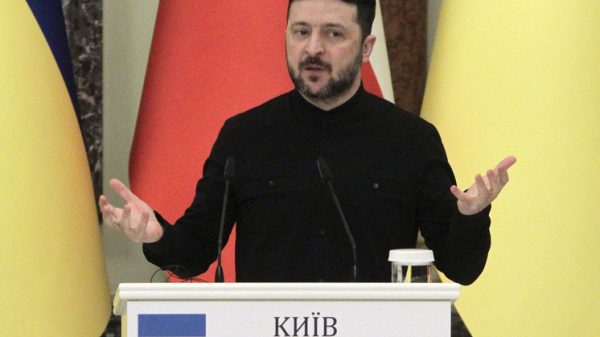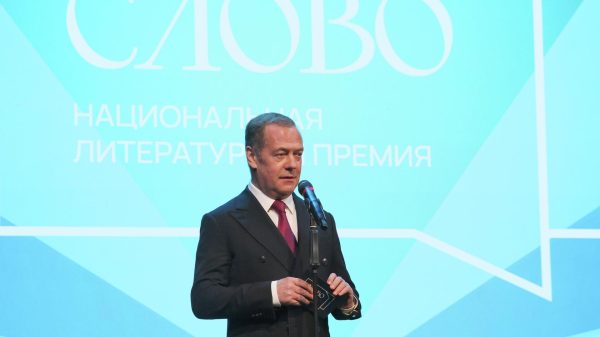 Igor Zhadanov: “My employees sent out updates to clients two weeks after the start of the war. That part of their lives was still there and they knew they could rely on it.” Photo: Eddie Mulholland
Igor Zhadanov: “My employees sent out updates to clients two weeks after the start of the war. That part of their lives was still there and they knew they could rely on it.” Photo: Eddie Mulholland
Igor Zhadanov saw Vladimir Putin's invasion coming sooner than most. In 2014, as Russia annexed Crimea and spread unrest to the Donbass, the CEO of software company Readdle began making plans.
Zhadanov's father managed the lines of communication within the Soviet military and considered the conflict just the beginning. “Because my father served in the army, I knew it was just a matter of when the next stage would come,” he says.
Zhadanov, who had founded the company seven years earlier in the port city of Odessa, began rebuilding his business so that no matter what happens in his homeland, Riddle will continue to act as usual.
We needed to make sure that whatever we did, we were going to continue to do it, we weren't going to let our customers down, and we weren't going to expose our customers no matter what happened to them. Odessa,” he says.
Readdle, which makes email and document apps for Apple devices, as well as task management software used by major companies such as BMW, Roche and Zurich, has moved data online and strengthened its systems, ensuring the company is ready for any further invasion.
So when Russian tanks entered Ukraine again in February 2022, she didn't miss a beat.
«Just take your families»
«My men were in the shelters spreading the news and responding to clients. I screamed at them: 'What are you doing, just grab your families.'»
«But they were sending updates to our clients two weeks after the war started , exactly as we promised. They realized that this part of their life is in its place and they can rely on it.»
Eighteen months later, Riddle's Odessa office is still operating, despite regular Russian attacks on the city, supported by two Starlink internet services. terminals, power generators, and food and water supplies. About 140 of Readdle's 310 employees remain in Ukraine.
“In Ukraine now, everyone is a volunteer. The whole country is resisting,” says Zhadanov.
“Only in Britain…”
The 39-year-old CEO and his brother Denis moved to London before the invasion as part of business development plans.
He is also in the process of opening an office in the capital as a legal entity in Britain, although adapting to life in Britain has not always gone smoothly.
Zhadanov says opening a bank account at Barclays took four months: “The system is so complicated, kind of confusing.”
When we meet, the strict rules of his office indoor photography mean that Zhadanov and The Telegraph photographer you'll have to brave the English rain to get a headshot. “Only in Britain,” notes Zhadanov.
 Zhadanov will have to endure the London rain. Photo: Eddie Mulholland Early start in Odessa< p>The company's employees are scattered around the world, in 35 countries, including Poland, Germany and Portugal. It's a common story. Ukraine has a young, tech-savvy population, which before the war was a rich recruiting ground for tech companies.
Zhadanov will have to endure the London rain. Photo: Eddie Mulholland Early start in Odessa< p>The company's employees are scattered around the world, in 35 countries, including Poland, Germany and Portugal. It's a common story. Ukraine has a young, tech-savvy population, which before the war was a rich recruiting ground for tech companies.
However, founding a technology startup was less common. Zhadanov's two co-founders, who founded the company in an Odessa apartment, were among the first in Europe to get their hands on an iPhone in 2007.
They created one of the first popular iPhone apps that allowed people to read documents and became an instant hit.
At that time, creating a startup in Ukraine was extremely rare, but now Readdle apps have been downloaded more than 220 million times. Much of his early success was due to the adoption of his applications by techies.
However, the company avoids Silicon Valley, which Zhadanov says is “unfortunately very transactional” and suffers from a cultural disconnect from much of the rest of the world.
But London is “an amazing place if you want to take advantage of opportunities.”
However, Zhadanov worries that the city risks becoming too expensive for tech companies to operate without the support of venture capital.
“I want to move a desk out of our office so we have room for a small chair and they want to bill us for £200. In Ukraine it used to be that for £200 you could hire someone to work for you full time for a week.”
Most of his staff are now returning to Ukraine as Kiev seeks to keep the economy humming condition. amid what is expected to be a protracted war. Zhadanov says that over the past year, about 40 people who left have returned.
“I am used to uncertainty, much more than a normal person, and perhaps much more than a normal person should be.”


























































Свежие комментарии